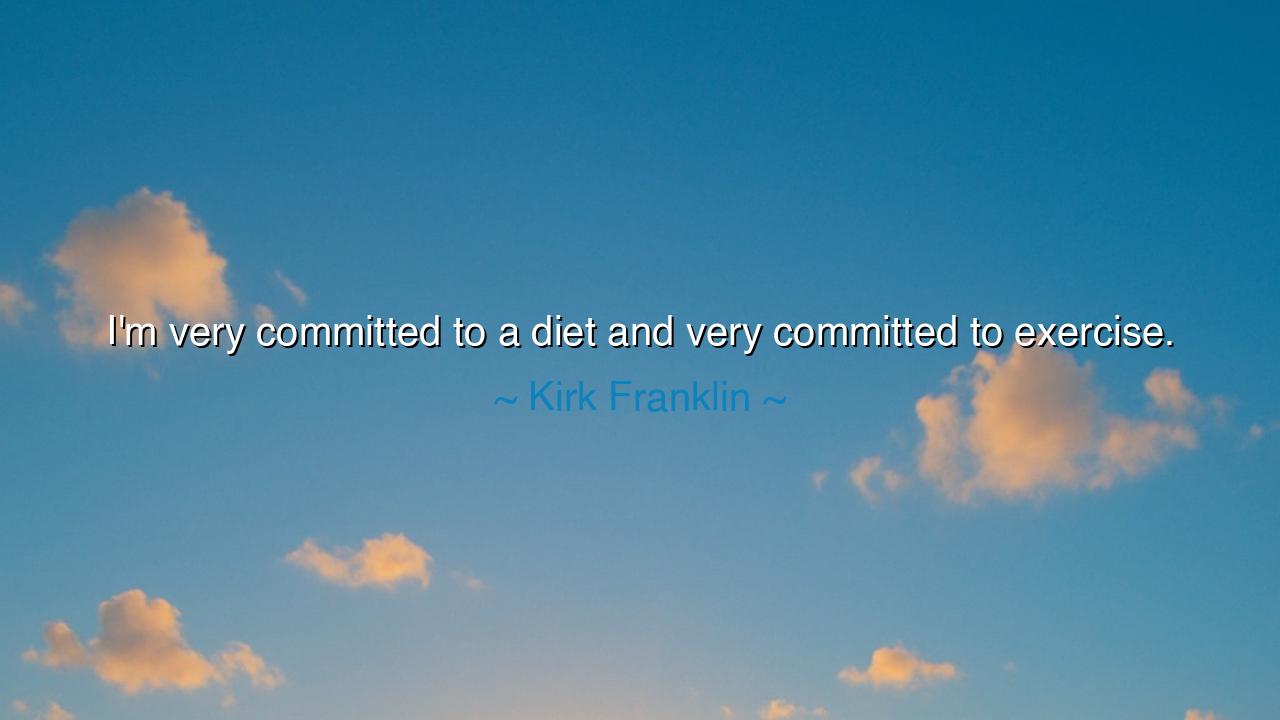
I'm very committed to a diet and very committed to exercise.






When Kirk Franklin declared, “I’m very committed to a diet and very committed to exercise,” he was not merely speaking of health, but of discipline, devotion, and the sacred stewardship of the body. His words, though simple, carry the weight of an ancient truth: that strength, whether of spirit or of flesh, is not granted — it is earned through consistency and care. To be committed to one’s diet and exercise is to honor the temple of one’s being, to see the body not as a burden, but as a vessel through which purpose flows.
Franklin’s quote reflects a philosophy of balance, an understanding that the physical and spiritual are bound together. In the old traditions, the wise never separated the care of the body from the cultivation of the soul. The Greeks trained in the gymnasia not merely to build muscle, but to develop harmony — they believed that a strong body was a reflection of an ordered mind. Likewise, the monks of the East, though devoted to prayer and meditation, practiced movement, fasting, and restraint, for they knew that a sluggish body dulls the fire of thought. Franklin’s words echo this same wisdom — that discipline in the physical world awakens clarity in the spiritual one.
To be “very committed,” as Franklin says, is an act of faith in routine — the daily willingness to choose effort over ease. The commitment to exercise and diet is not about vanity; it is about self-respect, about mastering the self that would rather drift toward comfort. The ancient Stoics, like Marcus Aurelius, taught that the one who commands himself is the truest ruler. Franklin’s devotion is, in essence, an act of command — a declaration that he will not be ruled by impulse, but by intention. Each workout, each measured meal, becomes a prayer of gratitude for life, a reaffirmation that discipline is love made visible.
There is an old story from the Spartan warriors that speaks to this truth. Before battle, they trained relentlessly, not only to harden their bodies, but to strengthen their minds against fear. When asked why they lived with such restraint, one warrior replied, “Because he who sweats more in training bleeds less in war.” In our modern world, the wars we fight may no longer be on the battlefield, but in the heart — against laziness, distraction, and doubt. Franklin’s “commitment” is the same warrior’s vow, reminding us that strength must be cultivated long before it is tested.
In another sense, Franklin’s devotion to health is also a form of service. As an artist and leader, he must give his best self to others — and he cannot pour from an empty vessel. By nurturing his physical body, he preserves the energy needed to inspire, to create, to uplift. This is a truth the ancients held sacred: the body is the servant of the soul’s mission. When the body is weak or neglected, the spirit’s voice falters; when it is disciplined, the spirit’s message flows with power and clarity. His daily choices, then, are not self-centered — they are acts of preparation for the greater calling that life demands of him.
The deeper wisdom in Franklin’s quote is that discipline is devotion in motion. To control what you eat, to rise and move when the body protests, is to worship the potential within you. It is to say to the universe: “I will not waste what I have been given.” In this way, every run, every healthy meal, becomes a sacred act — not separate from prayer or art, but part of the same holy rhythm of self-care and purpose. The ancients understood that those who honor their vessel honor the divine spark within it.
So, my listener, take this lesson to heart: be committed not only in word, but in habit. Do not view discipline as restriction, but as freedom — the freedom to rise, to endure, to live fully. Let your food be mindful, your movement deliberate, your rest earned. For when you tend the garden of your body with patience and gratitude, your spirit will bloom in strength and serenity. As Kirk Franklin reminds us, commitment is not a one-time promise, but a daily offering — a living testament that the sacred is not only in the heavens, but also within the pulse of your very being.






AAdministratorAdministrator
Welcome, honored guests. Please leave a comment, we will respond soon